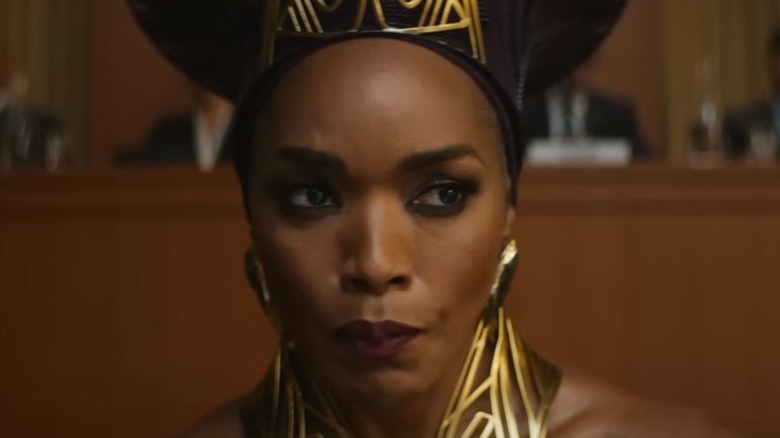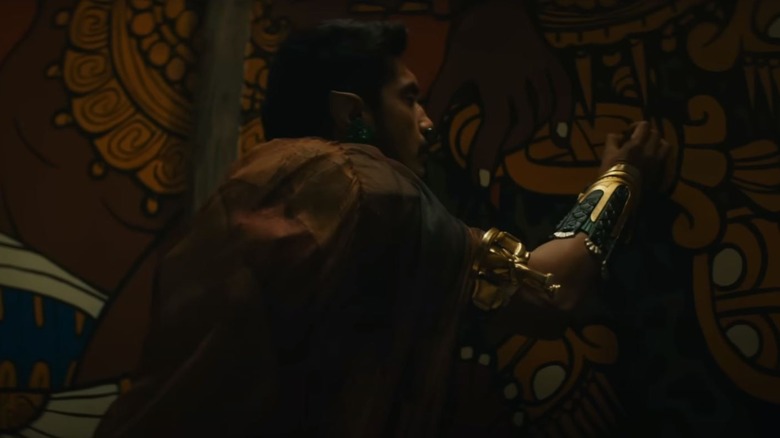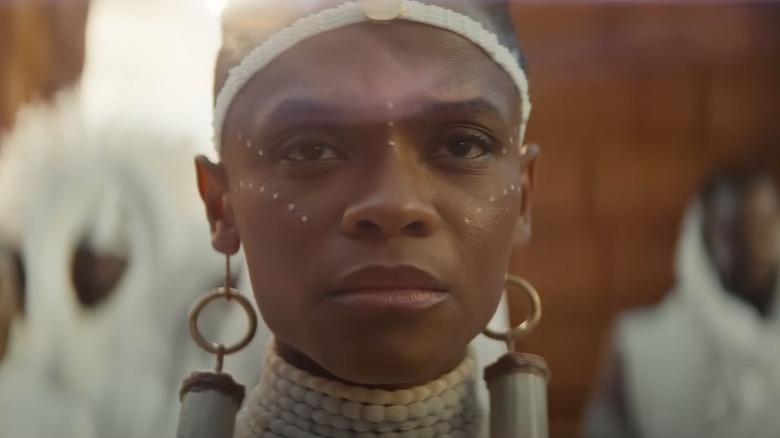Wakanda Forever Has Too Many Endings (& Not Enough Post-Credit Scenes)
Contains spoilers for "Black Panther: Wakanda Forever"
There's a lot going on in "Black Panther: Wakanda Forever," and as such, it's a pretty lengthy film. With its hefty 161-minute runtime, the "Black Panther" sequel can seem nearly as long as its name implies — and even when "Wakanda Forever" nears its end, the viewer doesn't get away with just one ending.
Due to the tragic death of Chadwick Boseman in 2020, "Wakanda Forever" is virtually an ensemble movie. Even though new Black Panther Shuri (Letitia Wright) predictably emerges as the main character, there are several others whose story arcs need to be wrapped up in a meaningful way, while also paying attention to the obligatory world-building and future teases that go with the ever-expanding MCU territory. As a result, "Wakanda Forever" has arguably way too many endings. Despite this, however, the movie's still lacking one of the most crucial cornerstones of a MCU project: It has simply too few post-credit scenes. Let's take a look why.
An ending soup with too many flavors
The closest thing that "Wakanda Forever" has to a real ending is the one involving Shuri and Nakia (Lupita Nyong'o), the two people alive who were closest to the dearly departed T'Challa (Boseman). As Shuri travels to visit Nakia in Cap-Haïtien to finally make peace with her brother's death, she discovers that he and Nakia have a secret son, Toussaint (Divine Love Konadu-Sun) ... who, like his father, also has the Wakandan name T'Challa. The boy's introduction is the movie's sole post-credit scene.
However, before the movie gets to this emotional gut punch, the viewer has already sat through several other character endings. MCU newcomer Riri Williams (Dominique Thorne) returns to MIT without her Wakandan Ironheart armor — but with a new best friend in Shuri, and as one of the few outsiders with established connections to Wakanda and intimate knowledge of its inner workings. Apart from Riri and Shuri, Okoye (Danai Gurira) of all people also gets both a happy ending and a superhero origin story. After resisting and insulting Shuri's "Midnight Angel" super suits for much of the movie, she finally agrees to lead a team wearing them after Ramonda (Angela Bassett) kicks her out of the Dora Milaje. Okoye ends the movie by busting Everett Ross (Martin Freeman) out of a prisoner transport van, which also teases interesting things to come for the eternally unlucky CIA agent.
Meanwhile, even the supposedly beaten antagonist Namor (Tenoch Huerta) manages to get a happy ending. After all, as he calmly explains Namora (Mabel Cadena), Talokan's new alliance with the powerful Wakanda is the absolute best-case scenario for an underwater kingdom that aspires to stay hidden, and wouldn't mind to see the total destruction of surface nations.
A post-credit scene that overrules all others
Perhaps the strangest "Wakanda Forever" ending comes courtesy of Jabari leader M'Baku (Winston Duke), who repeats his ritual combat challenge for the throne from the first movie ... but this time, he has inside intel that the current ruler isn't coming to fight back. It's highly unlikely that M'Baku has left Shuri tied on the train tracks somewhere, however. He arrives on the royal family's airship, has demonstrated a surprising amount of wisdom and kindness over the course of the movie, is in excellent terms with the new Black Panther, and pretty much all of Wakanda is indebted to him after his Jabari tribe sheltered them from Namor's threat. Combine all this with the fact that M'Baku is demonstrably an excellent leader and a good human being, and it's entirely possible that Shuri has simply agreed to let M'Baku take the throne after throwing around a challenger or two.
It's an intriguing scene that teases cool things for the future — just imagine King M'Baku sitting in one of those United Nations meetings, giving people his finest abrasive act and aggressively eating a carrot. Still, like some of the other endings, it's also a pretty throwaway scene in the grand scheme of things. So, why on earth aren't some of them post-credit scenes?
It's possible that Ryan Coogler and Marvel Studios wanted to keep the wham introduction of young Toussaint-slash-T'Challa as the movie's absolute final moment, especially since many of the endings that come before are considerably lighter in tone. Besides, the stinger is a direct continuation of Shuri's dress-burning ending, and the two flow quite nicely with the "burning fabric" end credits graphics and Rihanna's "Lift Me Up" that come in between. However, dedicating the movie's final moments to this touching sequence has the unfortunate side effect of giving "Wakanda Forever" numerous different endings before the final one ... and disappointing the plucky viewers who sit through the lengthy end credits to see a final piece of post-credit fun.


